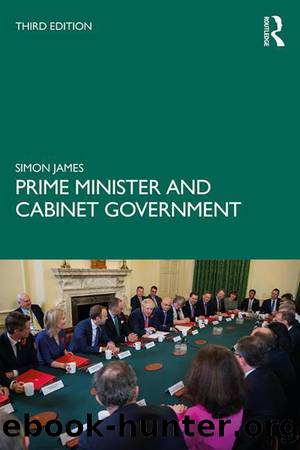Prime Minister and Cabinet Government by Simon James

Author:Simon James [James, Simon]
Language: eng
Format: epub
Tags: Constitutions, Public Affairs & Administration, Political Parties, Political Science, Political Process, Reference, General
ISBN: 9781351001465
Google: 1C_gDwAAQBAJ
Publisher: Routledge
Published: 2020-04-28T12:52:30+00:00
Prime Ministersâ style and personality
A lot hinges on style and personality: ministers respond better to business-like requests than to purposeless meddling, and to tact and humour rather than peremptory demands. In particular, a Prime Minister must know how to delegate, when to leave ministers alone, when to intervene without causing offence. From this point of view, the most effective of post-war Prime Ministers appears to have been Macmillan who, in the words of one of his ministers, the able Ian Macleod: âset a new standard of competence in the business of forming, controlling and guiding a Cabinet. He knew how to delegate to ministers and to leave them aloneâ (Spectator 14 February 1964).
Of his successors, Callaghan came closest to this gift for balancing judicious delegation against strong authority, rooted in an avuncular personality that varied from the genial to the grim (for example, Donoughue 1987). His successor Thatcher came as a complete contrast; although a good delegator and considerate in private, her dealings with ministers were blunt. She told them what she thought they should do. If they disagreed, she berated them. If they persisted, they argued it out in Cabinet or committee. If a minister argued too often, he was sacked. This âStalinist regimeâ, as one former confidant described it (John Biffen in the Sunday Telegraph 5 July 1987) worked often but not always, and her peremptory missives could infuriate ministers. If anything, the resulting antagonism diluted the automatic respect due to a Prime Minister and colleagues complied grudgingly rather than rushing to oblige.
When Major succeeded her, he deliberately adopted a contrasting approach.
It is a matter of instinct that if you carry people with you rather than ride through people you will get a better outcome than otherwise.⦠If, in the development of policy, I can reach a conclusion that I believe to be right with a minimum of noise rather than a maximum, I will do so. If I can soothe wounds, I will do so. If I can avoid people feeling excluded, I will avoid people feeling excluded.
(Major quoted in The Times, 27 November 1995)
His more courteous and thoughtful style went down well with his colleagues. As Heseltine put it: âJohn sums up at the end of a meeting rather than at the beginningâ. Ironically, though, when the going got rough some of his colleagues would ungratefully reminisce about his predecessor (Seldon 1997).
Blairâs style was famously relaxed: the term âsofa governmentâ was no metaphor, since he did much business stretched full length on the sofa in his office. He seemed to have relied heavily on personal charm; the difficulty is that people would leave a meeting with him with the impression that he had agreed with them, when this was not true (Bower 2016). He was a poor manager of people and treated ministers with little consideration; he desperately needed good Cabinet colleagues to carry through his reforms in health and education, yet lost an able Health Secretary, Milburn, and an able Education Secretary, Morris, when a little support and encouragement from him would probably have stopped them from resigning.
Download
This site does not store any files on its server. We only index and link to content provided by other sites. Please contact the content providers to delete copyright contents if any and email us, we'll remove relevant links or contents immediately.
Harry Potter and the Goblet Of Fire by J.K. Rowling(3026)
Unfinished: A Memoir by Priyanka Chopra Jonas(2912)
Never by Ken Follett(2873)
The Man Who Died Twice by Richard Osman(2291)
Machine Learning at Scale with H2O by Gregory Keys | David Whiting(2269)
Fairy Tale by Stephen King(2059)
Will by Will Smith(2033)
Rationality by Steven Pinker(1761)
The Storyteller by Dave Grohl(1656)
The Dawn of Everything: A New History of Humanity by David Graeber & David Wengrow(1565)
The Dark Hours by Michael Connelly(1563)
The Stranger in the Lifeboat by Mitch Albom(1529)
Cloud Cuckoo Land by Anthony Doerr(1428)
The Becoming by Nora Roberts(1324)
Friends, Lovers, and the Big Terrible Thing by Matthew Perry(1324)
Einstein: His Life and Universe by Walter Isaacson(1312)
Crying in H Mart by Michelle Zauner(1312)
New Morning Mercies: A Daily Gospel Devotional by Paul David Tripp(1305)
A Short History of War by Jeremy Black(1295)
